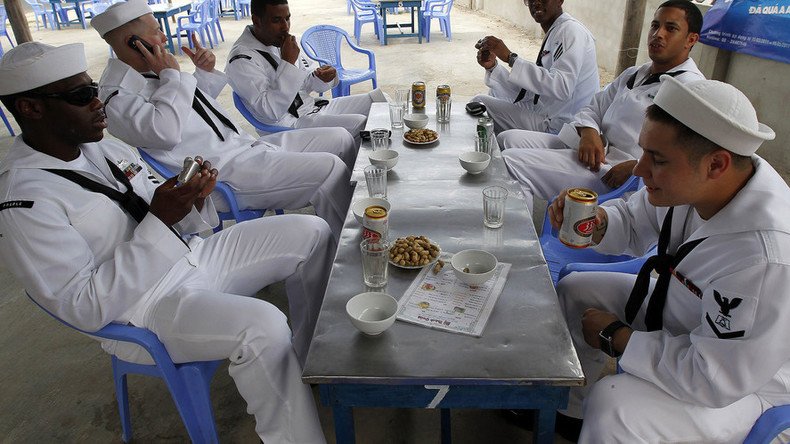11-day ‘dry law’: US sailors in Japan allowed to drink after brief booze ban

A drinking ban on 18,600 American sailors stationed in Japan has been lifted 11 days after it was imposed. The measure was introduced over a drunk-driving incident involving a US sailor. The military says the personnel have learnt their lesson.
A US sailor was arrested by Japanese police off Okinawa base in a drunk-driving head-on collision with two other cars on June 5. Two people were injured in the incident. The command quickly introduced full alcohol ban for all Navy personnel stationed in Japan, prohibiting consumption of alcohol on and off base.
All 18,600 US #Navy sailors in #Japan slapped with full drinking ban, confined to base https://t.co/N2Gz44VHhVpic.twitter.com/0bhOz3ZONX
— RT America (@RT_America) June 6, 2016
“The temporary restriction on alcohol was not intended to be a punishment, nor was it ever intended to be permanent,” Reuters quoted Rear Admiral Matthew Carter, commander of the US Navy in Japan, as saying in a statement, explaining the quick lifting of the ban.
The “pause” in drinking due to the imposed prohibition was necessary to “train” the personnel and make the sailors “reflect on the dangers of alcohol abuse,” Carter said.
The drunk-driving episode came as US-Japan relations have already been soured by murder and rape allegations against US citizens employed at American military facilities in Okinawa. In one case, an American employed at a military base was arrested on suspicion of murdering a 20-year-old local woman and in another one a marine pleaded guilty to raping a female tourist from Japan’s mainland.
Sailors are now allowed to drink alcohol on US bases and in private residences outside, yet visiting bars outside the gates of US bases is still prohibited for them.
“We must all be on the lookout to step in before alcohol-related incidents jeopardize our relationship with Japan,” Carter added.
Night patrol launched in #Okinawa after US base worker confessed to killing local woman https://t.co/gMrCDvul1Cpic.twitter.com/AhgxVLolVc
— RT (@RT_com) June 17, 2016
The announcement comes as demonstration against the US military presence on Okinawa is being planned for Sunday in the capital, Naha. The protest, supported by the governor, is expected to attract thousands of people who want the American military off their island.
Still, the command lifted the ban ahead of the protests “because our Sailors have demonstrated that they understand the strategic impact of their performance on liberty,” Stars and Stripes Japan cited Vice Admiral Joseph Aucoin, as saying.
US Marine confesses to raping Japanese tourist in Okinawahttps://t.co/2BqvETs3v5pic.twitter.com/T4ipREVCFq
— RT (@RT_com) May 27, 2016
“We can take further steps after our Sailors demonstrate the ability to drink responsibly,” he said.
“Responsible behavior by our Sailors in Japan is critical to our ability to provide security and stability in the Indo-Asia-Pacific,” Aucoin noted.
Okinawa is hosting over 70 percent of all American military facilities and half of all US military personnel in Japan.
The US Marines' Futenma air base agreed to be relocated to a less populated area of Okinawa over 20 years ago, in 1995, after Japanese schoolgirl rape incident involving US military personnel prompted outrage throughout Japan.
US military restricts troops in Okinawa after murder, rape https://t.co/7MjaGba8nhpic.twitter.com/FJdbhqocKA
— RT America (@RT_America) May 28, 2016
A recent poll conducted by the Ryukyu Shimpo newspaper and Okinawa Television on May 30-June 1, found out that absolute majority of respondents (83.8 percent) are opposed to the idea of relocating Marine Corps Air Station Futenma within Okinawa, demanding the base be expelled from the island.












